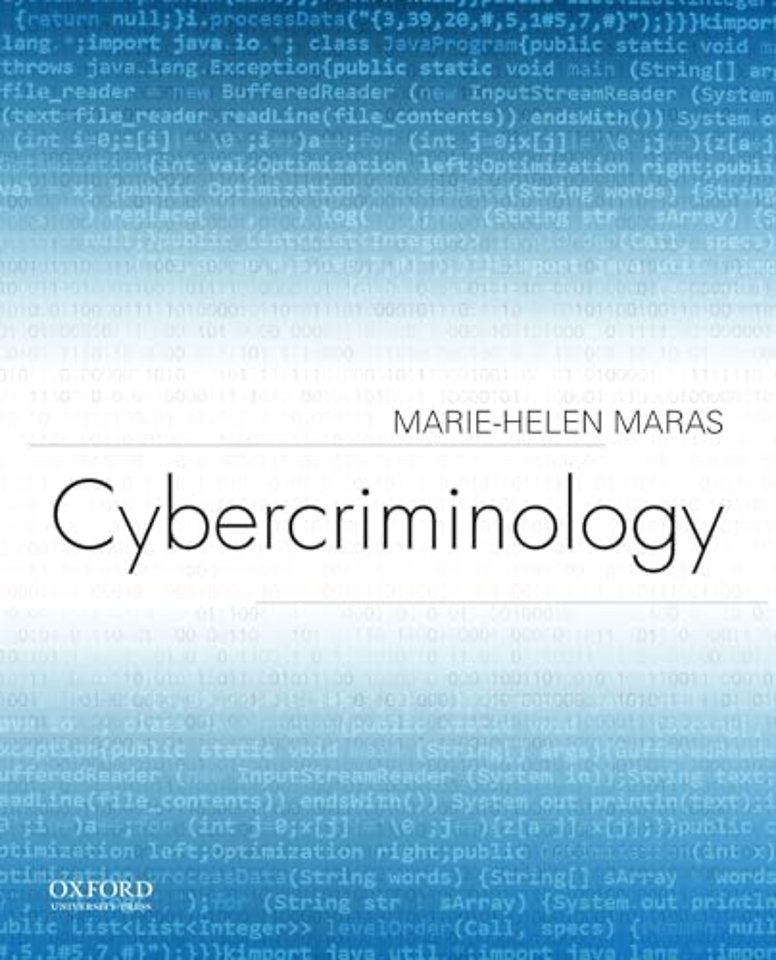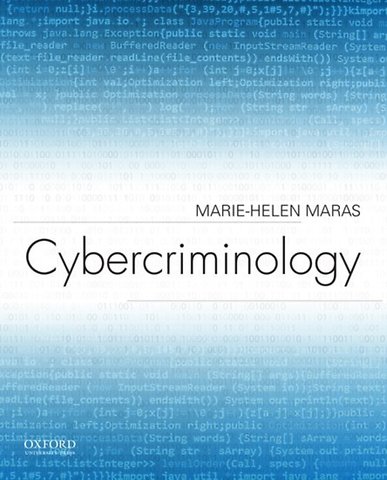


Marie-Helen Maras is an Associate Professor at John Jay College of Criminal Justice.
Meer over Marie-Helen MarasCybercriminology
Paperback Engels 2017 1e druk 9780190278441Samenvatting
A unique and comprehensive overview of the field and its current issues, Cybercriminology analyzes cybercrimes through the lens of criminology. Featuring an accessible, conversational writing style, it first discusses traditional criminological theories of criminal behavior and then analyzes how these theories-the existing literature and empirical studies—can be applied to explain cybercrimes. The text also introduces students to types of cybercrime, the nature and extent of cybercrime in the U.S. and abroad, and victim and offender behavior in the online environment.
FEATURES
- Real-world case studies and examples demonstrate the extent and complexity of cybercriminology
- Boxed features present compelling research topics and scenarios
- Review questions stimulate classroom discussions
- An Ancillary Resource Center contains an Instructor's Manual, a Test Bank, and PowerPoint lecture outlines
Trefwoorden
Specificaties
Lezersrecensies
Inhoudsopgave
PART 1. THE NATURE AND EXTENT OF CYBERCRIME
Chapter 1. Cybercrime and Cybercriminals: The Development of Cybercriminology
Cybercrime: The Basics
Cybercrime Categories
Cybertrespass and Cybervandalism
Cybertheft
Interpersonal Cybercrime
Cyberdeviance and Public Order Cybercrimes
Organized Cybercrime
Political Cybercrime
The Field of Cybercriminology
Case Study
Review Questions
Laws
Definitions
Endnotes
Chapter 2. Measuring Cybercrime
Uniform Crime Reporting Program
National Incident-Based Reporting System
Underreporting of Cybercrime
National Crime Victimization Survey
Other National Victimization Surveys
Self-Report Survey
National Computer Security Survey
Other Business Surveys
International Measurements of Cybercrime
Case Study
Review Questions
Laws
Definitions
Endnotes
Chapter 3. Cybervictimization
Being a Cybervictim and All That It Entails
The Profile of a Cybervictim
Victimization Theories
Victim Precipitation Theory
Lifestyle Exposure Theory
Routine Activities Theory
Case Study
Review Questions
Definitions
Endnotes
PART 2. CYBERCRIME CAUSATION AND REDUCTION
Chapter 4. Cybercrime, Rational Choice, and Emotions: Punishment and Reduction of Cyberoffending
The Reasoning Cybercriminal
Seductions and Repulsions of Cybercrime
Punishing Cybercriminals
Retributive Perspective
, Cybercriminals Getting Their "Just Deserts"
Utilitarian Perspective
, Incapacitation and Rehabilitation
, Deterrence
Reducing Cybercrime
Cybercrime Laws
Cybercrime Enforcement
Situational Crime Prevention
Case Study
Review Questions
Laws
Definitions
Endnotes
Chapter 5. Cybercrime and the Propensity to Offend
The Positivist School and Trait Theories
Cybercriminals: Born That Way
, Physiological Characteristics
, Brain Abnormalities
, Hormones
The Intelligence of Cybercriminals and the Psychology of Cybercrime: The New Positivists
Intelligence
Mental Disorders
Personality Theories
Psychoanalytical Theories
Attachment Theory
Internet Addiction and Cybercrime
Measuring Internet Addiction
Treatment
Case Study
Review Questions
Laws
Definitions
Endnotes
Chapter 6. Cybercrime, Culture, and Inequality
Chicago School of Criminology
Social Disorganization Theory
, Social Capital and Collective Efficacy
—Cyberspace: Applying the Broken Windows Theory
Anomie Theory
Institutional Anomie Theory
Relative Deprivation Theory
General Strain Theory
Cultural Deviance Theories
Delinquent Subculture Theory
Differential Opportunity Theory
Subcultures in the Virtual Environment
Case Study
Review Questions
Definitions
Endnotes
Chapter 7. Conformity, Learning, and Sources of Social Control
Controlling Cybercriminality
Learning Cybercriminality
Neutralizing Cyberoffenses
Moral Disengagement
Disinhibition, Deindividuation, and Anonymity
Developmental and Life-Course Cybercriminology
Latent Trait Perspective
, A General Theory of Cybercrime
Life-Course Perspective
Case Study
Review Questions
Laws
Definitions
Endnotes
Chapter 8. Constructing and Reacting to Cybercrime: Labeling and Moral Panics
Labeling Cybercriminals
Shaming, Censorship, and Defiance
Cybercriminals as "The Others"
Moral Panics
, The Literature on Moral Panics
, The Internet Gaming Moral Panic
Case Study
Review Questions
Laws
Definitions
Endnotes
Chapter 9. Conflict Cybercriminology: Cybercrime, Power, and Gender
Marxist Criminology
Left Realism
Peacemaking Criminology
Feminist Criminology
Variations in Cybercriminality: Mind the Gender Gap
Cyberfeminism
#GamerGate
Case Study
Review Questions
Laws
Definitions
Endnotes
PART 3. CYBERCRIME TYPOLOGIES
Chapter 10. Interpersonal Cybercrime
Internet Trolls
Cyberstalking
Criminalizing and Responding to Cyberstalking
Cyberharassment
Criminalizing and Responding to Cyberharassment
Revenge Porn as Cyberharassment
Cyberbullying
Criminalizing and Responding to Cyberbullying
Sextortion
Online Child Sexual Predation
Online Child Grooming
Criminalizing and Responding to Internet Sex Offenders and Child Pornography
Sexting
Controlling Interpersonal Cybercrime
Case Study
Review Questions
Laws
Definitions
Endnotes
Chapter 11. Cybertrespass, Cybervandalism, and Cybertheft
Cybertrespass and Cybervandalism
Hacking
Malware
Denial of Service and Distributed Denial of Service Attacks
Website Defacement
Cybertheft
Cyberidentity Theft
, Data Breaches
, Medical Identity Theft
, Internet of Things
Intellectual Property Theft
Controlling Cybertrespass, Cybervandalism, and Cybertheft
Case Study
Review Questions
Laws
Definitions
Endnotes
Chapter 12. Deviant Cyberacts and Public Order Cybercrimes: Paraphilia, Prostitution, Substance Abuse, and Gambling
The Relationship Between Law and Morality
Cyberdeviance
Paraphilia Online
Public Order Cybercrimes
Prostitution
, Facilitation of Prostitution via the Internet
—Can a Website Be a House of Prostitution?
—Prostitution: There Is An App for That
, Escorts: Prostitutes With a Different Name?
, Juvenile Prostitution
, Cyberprostitution, Cybersex, and Cyberpornography
Substance Abuse and Drugs Online
, Online Pharmacies
—Differentiating Licit, Illicit, and Fake Online Pharmacies
Internet Gambling
, Licit and Illicit Online Gambling Sites
, Regulating Internet Gambling
Controlling Cyberdeviance and Public Order Cybercrimes
Case Study
Review Questions
Laws
Definitions
Endnotes
Chapter 13. Organized Cybercrime
Organized Cybercrime: An Introduction
Activities of Organized Cybercriminals
Crime as a Service
Money Laundering
Drug Trafficking
Surface Web vs. Deep Web
, Darknet: The Underworld of Cyberspace
—Silk Road
Nature and Extent of Human Trafficking
Human Traffickers: Targets and Tactics of Control
Human Traffickers: Online Tactics
Organ Trafficking
Firearms Trafficking
Cigarette Trafficking
Wildlife Trafficking
Controlling Organized Cybercrime
Case Study
Review Questions
Laws
Definitions
Endnotes
Chapter 14. Political Cybercrime
Types of Political Cybercrime
Hacktivism
Cyberespionage
Cyberterrorism
Cyberwarfare
, Laws of War: Can They Be Applied to Cyberspace?
Controlling Political Cybercrime
Case Study
Review Questions
Laws
Definitions
Endnotes
Table of Laws
Index
Anderen die dit boek kochten, kochten ook
Rubrieken
- advisering
- algemeen management
- coaching en trainen
- communicatie en media
- economie
- financieel management
- inkoop en logistiek
- internet en social media
- it-management / ict
- juridisch
- leiderschap
- marketing
- mens en maatschappij
- non-profit
- ondernemen
- organisatiekunde
- personal finance
- personeelsmanagement
- persoonlijke effectiviteit
- projectmanagement
- psychologie
- reclame en verkoop
- strategisch management
- verandermanagement
- werk en loopbaan





